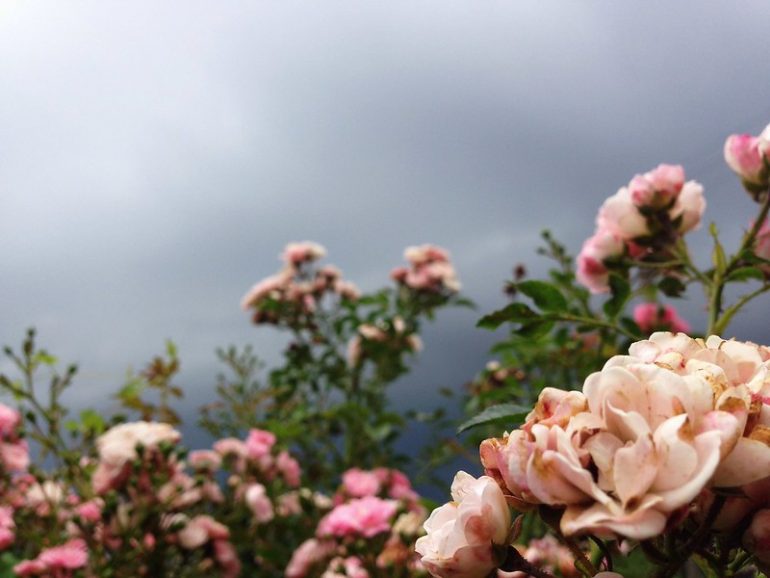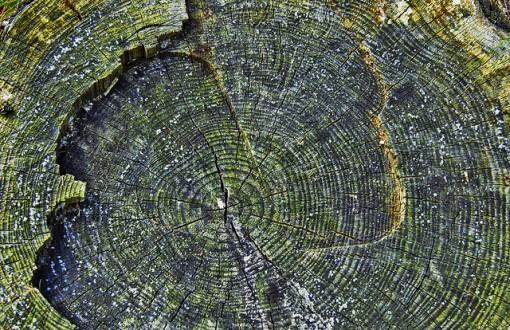Timothy Boudreau

In Lawn and Garden we sell our customers green sweet dreams, but this is our most difficult season. Throughout May cleanup, there are hard-shell beetles in all our smallest, most neglected rooms, at our homes and at work, the broom closet at Manager Dwight’s house, in Aurora’s grandma’s basement, in the back of the supply room. Iridescent, clicking, hissing, they crackle like gravel when Kara accidentally steps on a couple before switching on the light. Orb spiders in Dwight’s garage weave eerie double-helix webs, the silk yellowed like an old wedding gown. Even non-web-spinners, earwigs, beetles, mud wasps, all spin webs in the dark corners of the store’s basement, behind the stacks of stashed toilet paper, their webs sunlight gold, blood burgundy, electric blue. Manager Dwight, brooding over our impossible quarterly sales goals and his lonely nights at home with his lousy wi-fi, picks pieces of web off his pressed white shirt.
Lately Manager Dwight can’t distinguish people’s voices. Sometimes the words sound muffled, as if through a wad of polyester. When Mr. Turrentine, Aurora’s favorite customer, wanders in with one of his daily questions, this time about peonies, his shirt pocket overflowing with earwigs, Dwight stares at him without answering, flicks an earwig off his sleeve, and Aurora has to rush in to help.
Manager Dwight’s own thoughts sometimes come through like words on a faulty intercom, garbled and staticky, so he stands in the middle of the floor with a pallet of hoses, begonia and coleus six-packs, waiting for one of us to remind him what to do next. If I wasn’t eight years older and he wasn’t my supervisor, I’d touch his shoulder, brush the dead moths out of his hair, tell him, “It’s okay, it’s a weird time for everyone,” in my most calming voice, maybe lean in to kiss him on his doughy cheek.
At first we hear it’s the slant of solar rays through mushroom clouds of greenhouse gases that’s killing us, but it might be more than that. Aurora’s friend Amy is a gardener, a whole-earther; she’s definitely the most Connected one we know. She says we may be seeing a linkage, a collusion of components of the ecosystem to get rid of us.
The TV and internet scientists are unsure; they mention body chemistry, molecular levels, altered DNA, though they agree that the rest of the planet seems to be unaffected. The insects especially are thriving, maybe juiced by all the energy that we can’t suck up anymore, now that we’ve turned the Earth, its graces and gravity, against us.
Before a morning meeting, Manager Dwight pulls a bit of web from behind his ear, tries to flick it off his fingers. “Anyone else getting a pain in the kidney area?” he asks, reaching back to indicate the spot, wiping the web on a breakroom chair. “Or is it just me.”
“A little,” Aurora says, scrolling through her phone. “Amy says they think the first symptoms will vary.”
“My lungs hurt,” I say and take a lurching deep breath to demonstrate. “But maybe that’s stress?”
“My dad felt it in his eardrums first,” Kara says, touching her earlobe, tracing the vine tattoo winding down the side of her neck. She doesn’t go on to say, “before he had the abdominal pains,” or “before he collapsed,” or “before they put him on a ventilator,” though we know that’s in her head. “At first we thought he was just being silly about it.” She pulls a tree caterpillar out of the sugar bowl, sets it on the table, watches it crawl toward the edge. “But for him that was the start.”
Maybe Manager Dwight’s issue is caused by a shift in his neural chemistry, or maybe he’s just taking too much Super Melatonin to cope. He plants milkweed outside the back door, since it’s best for monarchs. If our organs are going to crumble from the inside, he at least wants to be surrounded by butterflies, the pulsing of wings, antenna and flickering color.
When the monarchs have taken over the storage bays, Dwight gets frantic; you can’t walk in and out without a couple catching in your hair or clinging to your shirt. “It’s the Season of Monarchs, Linette!” he cries at me, at poor Mr. Turrentine, at all of us, waving his pudgy arms, his white shirt spotted with shimmering orange and black. But who are we to remind him, that’s not the only Season it is?
__________
Corporate likes to tag all their ads, “It’s the Season for Savings!” In Lawn and Garden we make fun of them, announce, “It’s the Season for Stinkiness,” when Manager Dwight brings in smelly new mulches, “It’s the Season for Layoffs,” when Corporate has a bad year and there’s an announcement about Increasing Efficiencies, “It’s the Season for Fuck You,” when our merit increases are bypassed for another year.
“It’s the Season for Ants,” Kara tells Aurora and me on break. “Fucking things are taking over my kitchen.”
“Bitty ones you can hardly see,” Aurora says. “All around Amy’s coffee pot.” She tears her muffin into bite-size pieces. “They fly away when you try to kill them.”
“You have to pinch them with your fingernail.”
“You can’t pinch them. You can’t fucking catch them.”
“Like fleas,” Kara says, stabbing her thumbnail into her forefinger. “Squeeze ‘em.”
Aurora’s Gram doesn’t approve of Aurora and Amy, we know that, so all of us are extra supportive. Aurora’s cool, she brings in extra blueberry muffins, she listens to all our petty problems, she tells stories on herself where she’s the clown, tripping drunk at a party and spilling wine on her blouse, walking around in a cami until some drunk asshole told her to cover up, she was too fat.
“My gram told me to get out, so I’m staying at Amy’s full-time.” Aurora kicks at the catmint sprouting out of the floor around the register. “Gram says we’re disgusting.”
“Forget your Gram anyway, she doesn’t have the right to say that,” I want to tell her. But I’m not sure we’re close enough friends for that, so instead I say, “I’m so sorry, Aurora.”
“Are your eyes like aching all the time yet?” she asks, looking at me, her fingers brushing the register keys. “Most days I can barely see the numbers.” And her eyes, I notice now, blue-gray, like seastones, are red-rimmed, as if she’s been crying non-stop for weeks.
By mid-July we have hardly any customers. Maybe they’re thinking it’s too late for us to help, since the scientists’ most recent announcements of We’re Working on It but No Cure Yet. But we’re still here, dusting the displays, adjusting the sales percentages, setting up the register.
The night before our annuals go on sale, Aurora takes too much Super Melatonin, swallows another two just before weaving her way to work, and that day we’re all players in her lucid dreamscape. Manager Dwight drifts away at the end of a peach-pink balloon; Kara and I float in a leaf boat in a sea just beyond the parking lot, the tattoo queen and the middle-aged lady. In Aurora’s dream Kara has serpent tattoos on her neck, slitheringly alive, and I’m an old granny, crocheting a scarf from the snakes’ shed skin. We don’t ask Aurora, “Why does Kara seem so scary? Why is Linette such an old crone? Why does Mr. Turrentine look like a sour version of your Gram?” because it’s a dream. You can’t expect it to make sense, especially now.
__________
The tent caterpillar explosion happens just after Manager Dwight tells us we’re not running the scheduled pesticide sale. “No way we’re spotlighting poison at this point in the life of the planet,” he says. He’s grumpier now because he has no evening entertainment, his wi-fi is officially kaput and his provider tells him there’s a six-month waiting list for service.
“They’re definitely doing things they don’t normally do,” Kara says, tapping her wrist, along her slime-green mantis tattoo, as a web tent sways from a parking lot light pole and the caterpillars pour out, engulfing an abandoned Jeep. “They seem really intense.”
“Is there a difference between tent caterpillars and webworms?” Dwight asks later, his sad saggy eyes watching a batch of them crawl up the Miracle-Gro display. “I feel like there’s a difference”
“The tent caterpillar population spikes every ten years or so,” Amy tells Aurora, who tells Kara and me, “typically followed by a spike in their predators: orioles, cuckoos.”
We listen in the back of the store as another caterpillar tent expands, a line of shelving cracks, the silken bag opens and the caterpillars surge into the flowerpot aisle, husks of their abandoned exoskeletons spilling out behind them.
“Not to mention parasites and parasitoids,” Aurora again quotes Amy as we take our breaks together at the picnic table outside.
Kara and I nod, watching a bag of dried caterpillar parts hanging from the gray bones of a dead tree.
“But Amy says we can’t think of the typical anymore.”
__________
By August it’s harder. We’re all feeling something. Maybe it’s just tension, but we all ache; we wonder if our organs are still working right; our extremities are tender. We’re moody but trying not to show it.
“Amy says spiders inject their prey with an enzyme that liquifies their insides before they consume them,” Aurora tells us at the end of the day after we’ve locked up, wiped things down, balanced the cash. “Maybe it’s happening like that.”
Golden rod and ragweed grow out of the breakroom floor seams; we have to push through it to get to our lockers in back. Beetles are still scurrying around underfoot, crackling, hissing, but we barely hear them anymore.
“So the world’s poisoning us,” Kara says.
“But first we poisoned the world,” Aurora says.
“So—justice,” Kara says, looking down, tracing the mantis tattoo, the one above it that says “Daddy” inside a jagged gray heart.
Amy’s prepping supplies, Aurora tells us before Labor Day, harvesting jewelweed, collecting the seeds for snacks, extracting the sap to treat our poison ivy.
“It’s the Season for Fireworks,” I tell Aurora while we sit in lawn chairs beside the register eating our lunch, piped-in Hits of the 90s still warbling around us in the empty store. “Ever since July. Like every night after nine,” I go on, picturing my neighbors pulling out basement stashes of Roman candles, lighting a few each night, now that we’re all talking about the end of the world.
I think I’m in love with Dwight, I want to say, those confused puffy eyes are getting to me, but I can’t tell anyone that now. I imagine driving to his house, rescuing him from his wi-fi-less existence to watch fireworks with me—the particles of light and color flicker-fading into the ground, as we hold hands on our diseased planet, facing the stars.
“We hear them too, Linette. Every night,” Aurora says, her seastone eyes milky with Super Melatonin. We means Amy and her, but it comes out sad. In the word I hear I can’t believe we found each other, I can’t believe we’ll all be gone so soon.
Timothy Boudreau’s recent work appears at New World Writing, Retreat West, Ellipsis, and X-R-A-Y, and has been nominated for Best Microfiction and a Pushcart Prize. His collection Saturday Night and other Short Stories is available through Hobblebush Books. Find him on Twitter at @tcboudreau or at timothyboudreau.com.



